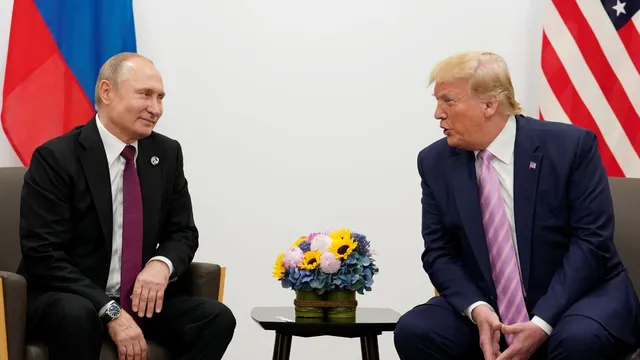- By Supratik Das
- Tue, 05 Aug 2025 10:50 AM (IST)
- Source:JND
Russia INF treaty withdrawal: In a significant escalation of global strategic tensions, Russia on Monday declared that it no longer feels obligated by the historic Intermediate-Range Nuclear Forces (INF) Treaty. The declaration comes on the heels of a sudden rise in aggressive rhetoric and military exercises between Washington and Moscow, with Russian officials accusing "the actions of Western states", specifically, NATO's militarisation and recent American deployments of cruise missiles, of posing a "direct threat" to Russian national security.
The Russian Foreign Ministry, in a detailed statement reported by state media channel RT, announced the cancellation of the self-imposed ban on the deployment of intermediate-range missiles, a pillar of the defunct treaty. The ministry cited recent developments, such as the stationing of a Typhoon missile launcher in the Philippines and missile exercises during the Talisman Sabre drill in Australia, as key factors for the reversal."The conditions for the preservation of a unilateral moratorium have vanished. The United States and its allies are actively deploying destabilising missile systems near Russian borders. These actions dismember strategic stability and put pressure on our security," the statement said.
Trump's Submarine Move Triggered Strategic Shift
Russia's official pullout from the INF Treaty follows barely days after US President Donald Trump directed two nuclear submarines to be "positioned in appropriate regions", a subtle threat widely seen as a direct message to Moscow. Trump's action was preceded by inflammatory comments by former Russian President Dmitry Medvedev, who threatened deteriorating relations and the potential for wider conflict if Washington persists with its aggressive stance. Trump, in an interview with Newsmax, justified his order by stating, "When you talk about nuclear, we have to be ready… and we're completely ready." The US president recently ratcheted up pressure on Moscow to bring an end to its current war with Ukraine, delivering a new ultimatum and threatening sweeping new sanctions in the event Russia fails to fall into line by August 9. A special envoy, Steve Witkoff, will arrive in Moscow this week to engage in high-level discussions before the deadline.
The former President Dmitry Medvedev, today's Deputy Chair of Russia's Security Council, took a jab at Trump's ultimatum and the deployment of submarines by saying that "each new ultimatum is a threat and a step towards war, not with Ukraine, but with the US itself. Referring to the INF withdrawal as being a part of a "new reality" in international nuclear posture, Medvedev threatened that additional steps would be taken. He did not mention, though, what retaliatory measures Russia would take. Meanwhile, Kremlin press secretary Dmitry Peskov tried to play down the rhetoric and stressed that Russia is still committed to nuclear non-proliferation and appealed for prudence. "Everyone should be very, very careful with nuclear rhetoric," Peskov told AFP.
ALSO READ: Trump Claims India Aiding Russia Amid Ukraine War, Vows 'Substantial' Tariff Hike
INF Treaty Collapse Leaves Strategic Gap
The INF Treaty, which was signed in 1987 by then-US President Ronald Reagan and Soviet leader Mikhail Gorbachev, was a historic Cold War-era agreement that barred all ground-launched ballistic and cruise missiles with ranges of between 500 and 5,500 kilometres. The treaty was celebrated as a stabilizing force within Europe and a significant step towards nuclear de-escalation. Still, the US left the INF Treaty in 2019, alleging Russia's non-compliance, accusations that Moscow has repeatedly rejected. In rebuttal, Russia had also been holding a unilateral moratorium, promising not to station the prohibited missile systems if the US made a corresponding move. Russian Foreign Minister Sergei Lavrov had earlier indicated that such restraint might cease because of what he described as "destabilising actions by NATO and the US" in Europe and the Asia-Pacific. Monday's statement signifies the formal end to that moratorium.
As President Trump's August 9 deadline closes in, and prominent American and Russian leaders exchange insults, diplomatic efforts look more precarious by the minute. Analysts predict the collapse of the INF Treaty will eliminate one of the last significant arms control deals between the world's two biggest nuclear powers, leaving the prospect of a new arms race and rising danger of miscalculation or conflict. Russia's recent move highlights the worsening Moscow-Washington relationship and refocuses international attention on the need for renewed talks about arms control to avoid undoing decades of nuclear stability.

